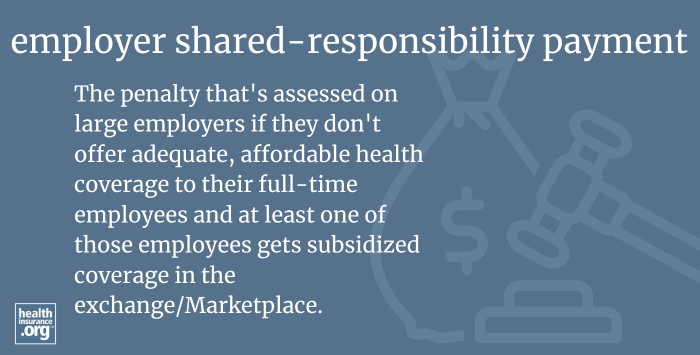
What is the employer shared-responsibility payment?
The employer shared-responsibility payment is the penalty that's assessed on large employers if they don't offer adequate, affordable health coverage to their full-time employees and at least one of those employees gets subsidized coverage in the exchange/Marketplace.
Since 2015, employers with at least 50 full-time equivalent employees have been required to offer health coverage to at least 95% of their full-time employees (full-time means at least 30 hours per week). The coverage must provide minimum value and be considered affordable.
(Note that the affordability determination is based on the lowest-cost plan that the employer offers, as long as it provides minimum value. This may not be the plan that the employee prefers or is enrolled in, but it's what's used to determine whether the employer is compliant with the employer mandate.)
If the employer doesn't offer coverage or doesn't offer at least one plan that is affordable and provides minimum value, and if at least one full-time employee obtains a premium tax credit (subsidy) in the health insurance exchange/Marketplace, the employer is subject to a penalty, known as the employer shared-responsibility payment.
How much is the employer shared-responsibility payment?
The penalty depends on whether the employer doesn't offer coverage at all, or offers coverage that either isn't affordable and/or doesn't provide minimum value. The dollar amount that's used to calculate each penalty is inflation-adjusted each year (see question 55 in this IRS guidance). Here's how it works for 2025:1
- If the employer doesn't offer coverage at all and at least one full-time employee obtains a subsidy in the exchange, the penalty is calculated by taking the total number of full-time employees the business has, subtracting 30, and multiplying the result by $2,900 (note that this is a little lower than the penalty that applied in 20242).
- If the employer offers coverage but it isn't affordable and/or doesn't provide minimum value, the penalty is calculated by determining how many employees received subsidized coverage in the Marketplace, and multiplying that number by $4,350 (also lower than the penalty that applied in 2024). But the amount of this penalty will never be higher than the penalty that would apply if the employer didn't offer coverage at all, so the first calculation is used instead if it would be a smaller penalty.
Footnotes
- "Revenue Procedure 2024-14" Internal Revenue Service. Accessed Nov. 13, 2024 ⤶
- Revenue Procedure 2023-29. Internal Revenue Service. Accessed December 2023 ⤶


